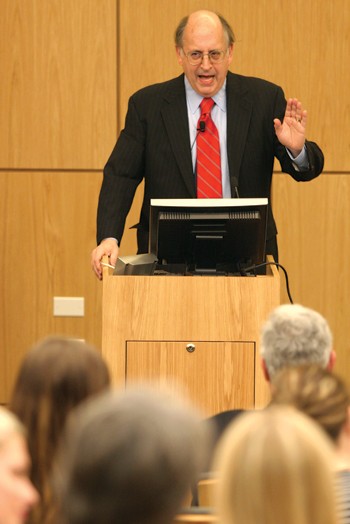
Allan Sloan, editor-at-large for Fortune Magazine, speaks to students on the topic of “Is Journalism Dead? And Should it Be?” yesterday afternoon at the William O’Neil Lecture in the Crum Auditorium. (Lindsey Perkins)
The Meadows School Division of Journalism and the Cox School of Business sponsored a William J. O’ Neil lecture Tuesday featuring Allan Sloane entitled “Is Journalism Dead? And Should it Be?”
Sloane is the current editor-at-large of Fortune magazine. He has worked in the newspaper industry for 30 years as a business journalist for publications such as Newsweek magazine.
“The traditional thing is to get up and talk about the end of journalism,” Sloane said. “I don’t think journalism is dead. Journalism has a business problem.”
Sloane said that the newspaper industry is going to have to find someone to pay for it. One of the problems is the fact that the motto of newspapers used to be that “journalism attracts people to the advertising,” he said, but the years went by and this trend stopped as the Internet was developed.
Eventually, Sloane said, the newspaper industry woke up and instead of trying to figure out how to attract people to the advertising, they got rid of the “overhead,” or writers.
“This has not been a pleasant experience,” he said.
Sloane also said that the industry is trying to do more with less.
“You end up doing less with less,” he said. “It doesn’t make any sense. It’ll work for all of us someday as soon as someone figures [out how to solve the problem].”
There is hope for the industry and journalists, Sloane said.
“There’s a business in business journalism and there’s certainly a business in journalism,” he said. “Somewhere in all of this there is a business who will hire [journalists]. It exists somewhere, we just haven’t found it yet.”
Sloane said that the skills learned through journalism are “eternal” and can be used in many other professions, such as law and business. “These are skills that will serve you well,” he said.
While Sloane believes that most of the industry is moving toward the Internet, he thinks specialty magazines will stay in print. Newspapers, he projects, will become a hybrid of traditional print and online mediums.
“Journalism still works,” he said. “It’s a money question.”








